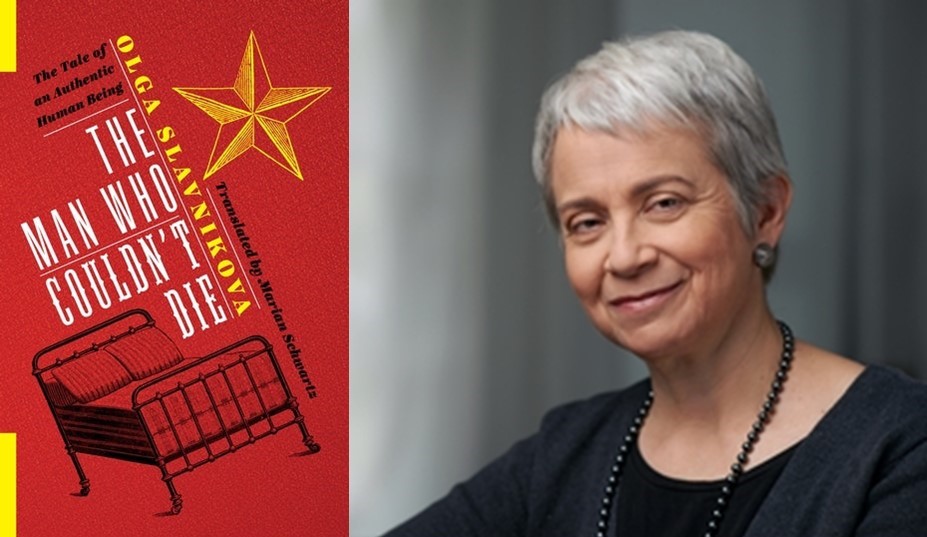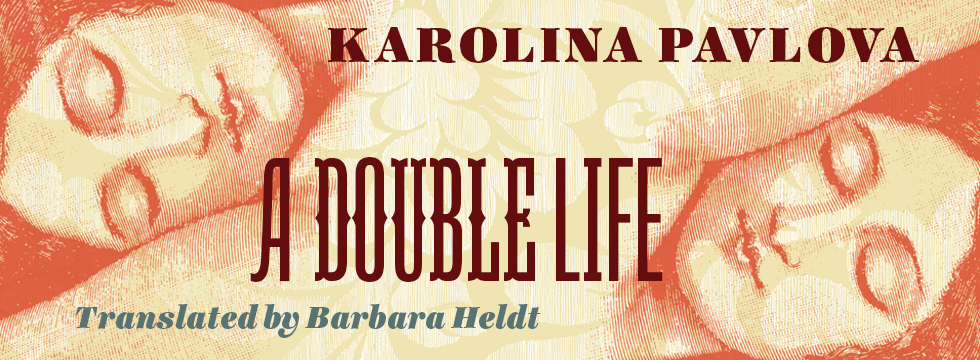Q&A: Marian Schwartz on The Man Who Couldn’t Die

“Darkly sardonic . . . . oddly timely, for there are all sorts of understated hints about voter fraud, graft, payoffs, and the endless promises of politicians who have no intention of keeping them. It is also deftly constructed, portraying a world and a cast of characters who are caught between the orderly if drab world of old and the chaos of the ‘new rich’ in a putative democracy. . . . Slavnikova is a writer American readers will want to have more of.”
-Kirkus Reviews (starred review)
This week for Women in Translation month we’re exploring Russian literature. Yesterday, translator Lisa C. Hayden discussed Margarita Khemlin’s Klotsvog, as a beach read. In today’s Q&A, translator Marian Schwartz discusses her collaboration with Olga Slavnikova (the author of The Man Who Couldn’t Die) and the many meanings of authenticity in this “tale of an authentic human being.”
Remember to enter this week’s drawing for a chance to win one of this week’s featured titles!
• • • • • •
Q: The Man Who Couldn’t Die is very funny, but translating humor across languages and cultures can be a particular challenge. How did you approach the novel’s satirical elements? Were there instances where something that worked in the Russian seemed like it might not work in English?
Marian Schwartz: That you found it funny at all is a real tribute to Slavnikova. In translating the humorous moments I followed her example in creating as dry a tone as possible, and that tone, I think, is the reader’s cue that something is up. For readers who know who Brezhnev was, who appreciate the “wild west” of early Russian “democracy,” and can picture the Marina’s ill-begotten purse all too well, fewer hints are probably needed. But to readers unfamiliar with the Soviet world and its wake, this kind of dead-pan gives them a nudge. I particularly love the madcap, if tragic, portrayal of that then-exotic phenomenon: a Russian election campaign. A perfect example comes relatively early on, when Shishkov hits upon what he thinks will be the key to Krugal’s campaign—essentially, buying votes. Slavnikova signals the pure insanity of his scheme—and the disaster to ensue from it—by very abruptly dropping her pervasive metaphors and colorful visual images, as if to say, “Pay attention to this.” “The professor had hit on a new and surefire campaign move, though. For quite a while an elementary arithmetic thought had given him no rest, that the two thousand-plus votes he needed for victory (half of a 25 percent turnout plus one vote from the Unknown Soldier), would cost, based on the average price of a vottle of vodka, one-third of what it cost to purchase newspaper space, produce flyers, and rent auditoriums, where the entreated voters would consist of a few vagrants, whose wild hair and short stature made them look like alcoholic goblins, and a dozen or so old women bored out of their minds.” Note that this is all one sentence and also the embedded zinger: “plus one vote from the Unknown Soldier.”
Q: What attracted you to this project? How did you get involved as the translator?
MS: I’ve been working with Slavnikova since about 2003, when an excerpt from what would eventually become her novel 2017 was published in Glas, whose very knowledgeable editor Natasha Perova first brought the piece to my attention. Based on that experience, I began reading everything Slavnikova wrote, but it was this novel, Bessmertnyi, that always stuck with me. Slavnikova is often associated with rich metaphors and intricate syntax, and yet, what keeps me coming back to her work is her psychological insight, her compassion for her characters, who I find altogether real and compelling, often moving.
Q: Translation requires a lot of time with a text, and this cast seems like a difficult one to live among for so long. None of the characters in The Man Who Couldn’t Die seems particularly happy or fulfilled, none very likeable. How do you understand their strained relationships?
MS: I translate Russian literature. “Likeability” may not be a category in my world. Sympathy, honesty, and empathy, however, very much are. I’ve always been interested in how people and cultures adapt to averse conditions and what extreme circumstances bring out in human nature. Desperation is the driving factor for many of the characters, even Marina, the most pragmatic of the sympathetic characters, yet even she thinks in philosophical terms about how her past life “had suddenly turned up here and surrounded her now much more solidly and persistently than the reality of the crumbling streets….”
Q: The novel is subtitled “The Tale of an Authentic Human Being.” What does the subtitle refer to? Do you think of any of the characters as “authentic” amid such distortion of truth? How does authenticity fit into The Man Who Couldn’t Die, a translation of a work of fiction about extensive deceptions?
MS: The book’s subtitle is interesting in relation to the Russian title, Bessmertnyi—The Immortal One. Russians associate that word with war heroes, who are referred to in World War II memorials as “immortal.” That’s not a connection a non-Russian would make and so I chose to write a title that plays on another implication that is so cleverly expressed in English: he couldn’t die both because his family needed him but also because he couldn’t kill himself, no matter how hard he tried. But for the Russian reader, Alexei Afanasievich’s authenticity has some basis in his being “immortal,” a hero. The English reader eventually gets to that connection, too, as the novel progresses.
Alexei Afanasievich, the paralyzed WW II veteran, exudes authenticity, of course; his merit comes down to his integrity. Modern readers may be appalled at his conservative view of marriage, but he’s perfectly honest about it. And his relentless effort to hang himself expresses a purity that elevates him as a human being. There’s no way of knowing for sure, but doesn’t it seem plausible that he’s too authentic not to know very well that his family is lying to him in some way? Certainly he can allow the idea that Brezhnev has died, if not that the Soviet Union has fallen, but the point here is that he may be too authentic not to detect what is false.
At the other end of the authenticity spectrum there is Klumba, the benefits rep assigned to Alexei Afanasievich’s pension who insinuates herself into the canvasser payment scheme, a woman genuinely committed to the falseness of everything she has ever known. It’s easy to imagine her in the Soviet era as willing to be oblivious to the lies of her world in exchange for a sense of personal security. Now that the safety net has been ripped out from under her, she is terrified. She attempts to recreate that world—but the fact that she is not stupid and at some level aware that the rules have changed, scares her all the more and drives her actions.
For Slavnikova, in-authenticity is like bad karma–certain to come back at you–and flashes of authenticity mark turning points in people’s lives. The instant Nina Alexandrovna witnesses her husband’s suicide attempt—and admits its full significance—she becomes personally stronger, more authentic, less afraid, in part because it wipes away the deception between them and in part because she is able to face her own youthful suicide attempt squarely.
Contrasted to authenticity in this book is not in-authenticity so much as nostalgia. Authenticity gives strength and peace of mind; nostalgia is directly correlated to fear. These two opposites rise—and fall—in sync. If Alexei Afanasievich can be strong while paralyzed and at peace while trying to commit suicide, none are more nostalgic—and fearful—than the people who line up at campaign headquarters for their “due,” like desperate Soviet sheep.
Between these two extremes is everyone else, but especially Marina, the stepdaughter, who has heroically plunged into a sea of dishonesty and corruption but is too decent, maybe even authentic, to stay afloat.








